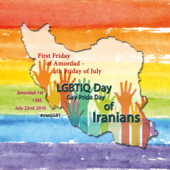Anti-LGBT rhetoric comprises themes, catchphrases, and slogans that have been used in order to demean lesbian, gay, bisexual, and transgender (LGBT) people. They range from the demeaning and the pejorative to expressions of hostility towards homosexuality which are based on religious, medical, or moral grounds. It is a form of hate speech, which is illegal in countries such as the Netherlands, Norway, and Sweden.

Lesbian, gay, bisexual and transgender (LGBT) people in Iran face severe challenges not experienced by non-LGBT residents. Sexual activity between members of the same sex is illegal and can be punishable by death, and people can legally change their assigned sex only through a sex reassignment surgery. Currently, Iran is the only country confirmed to execute gay people federally, though death penalty for homosexuality might be enacted in Afghanistan.

Lesbian, gay, bisexual and transgender (LGBT) people in Belarus face significant challenges not experienced by non-LGBT residents. Both male and female same-sex sexual activity are legal in Belarus. However, households headed by same-sex couples are not eligible for the same legal protections available to opposite-sex couples. Belarus provides no anti-discrimination protections for LGBT people, nor does it prohibit hate crimes based on sexual orientation and gender identity.

Lesbian, gay, bisexual and transgender (LGBT) people in Ukraine face legal and social challenges not experienced by non-LGBT individuals; historically, the prevailing social and political attitudes have been intolerant of LGBT people, and strong evidence suggests this attitude remains in parts of the wider society. Since the fall of the Soviet Union and Ukraine's independence in 1991, the Ukrainian LGBT community has gradually become more visible and more organized politically, organizing several LGBT events in Kyiv, Odesa, Kharkiv, and Kryvyi Rih.

Lesbian, gay, bisexual, and transgender (LGBT) persons in Bosnia and Herzegovina may face legal challenges not experienced by non-LGBT residents. Both male and female same-sex sexual activity are legal in Bosnia and Herzegovina. However, households headed by same-sex couples are not eligible for the same legal protections available to opposite-sex couples.
Homosexuality in India has been documented and discussed in various artworks and literary works since ancient times and continues to be a major discussion point as LGBTQ rights are advanced in modern politics.

Lesbian, gay, bisexual, and transgender (LGBT) rights in Cyprus have evolved in recent years, but LGBT people still face legal challenges not experienced by non-LGBT residents. Both male and female same-sex sexual activity are legal in Cyprus since 1998, and civil unions which grant several of the rights and benefits of marriage have been legal since December 2015. Conversion therapy was banned in Cyprus in May 2023.
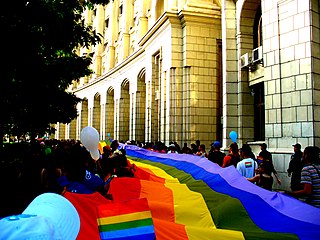
Bucharest Pride, known previously as GayFest, is the annual festival dedicated to LGBT rights in Romania, taking place in Bucharest for nearly a week. Current event organizer is Kyle David Kipp. It first took place in 2004 and now occurs in May–June of each year, culminating with the March of Diversity. It is organised by the non-profit organisation ACCEPT, the country's largest lesbian, gay, bisexual and transgender (LGBT) rights organisation. The festival also receives funding from the Romanian Ministry of Health and the National Council for Combating Discrimination, as well as a number of private organisations, such as the Open Society Institute and the British Council in Romania.

LGBT people in Azerbaijan face significant challenges not experienced by non-LGBT residents. Same-sex sexual activity has been legal in Azerbaijan since 1 September 2000. Nonetheless, discrimination on the basis of sexual orientation and gender identity are not banned in the country and same-sex marriage is not recognized.

Lesbian, gay, bisexual and transgender (LGBT) people in Georgia face significant challenges not experienced by non-LGBT residents. Georgia is one of only a few countries in the former Soviet space that directly prohibits discrimination against all LGBT people in legislation, labor-related or otherwise. Since 2012, Georgian law has considered crimes committed on the grounds of one's sexual orientation or gender identity an aggravating factor in prosecution. The legislative ban on discrimination has been enacted as a part of the Government efforts to bring the country closer to the European Union and make the country's human rights record in line with the demands of Georgia's European and Euro-Atlantic integration.

Lesbian, gay, bisexual, and transgender (LGBT) people in Moldova face legal and social challenges and discrimination not experienced by non-LGBT residents. Households headed by same-sex couples are not eligible for the same rights and benefits as households headed by opposite-sex couples. Same-sex unions are not recognized in the country, so consequently same-sex couples have little to no legal protection. Nevertheless, Moldova bans discrimination based on sexual orientation in the workplace, and same-sex sexual activity has been legal since 1995.
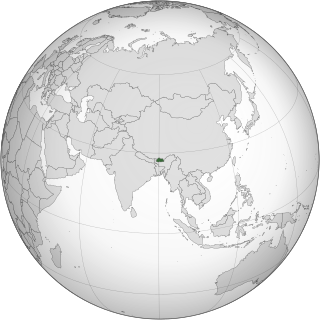
Lesbian, gay, bisexual and transgender (LGBT) people in Bhutan face legal challenges that are not faced by non-LGBT people. Same-sex sexual activity was decriminalised in Bhutan on 17 February 2021.
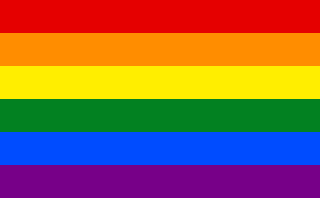
The rainbow flag or pride flag is a symbol of LGBT pride and LGBT social movements. The colors reflect the diversity of the LGBT community and the spectrum of human sexuality and gender. Using a rainbow flag as a symbol of LGBT pride began in San Francisco, California, but eventually became common at LGBT rights events worldwide.

LGBT pride is the promotion of the self-affirmation, dignity, equality, and increased visibility of lesbian, gay, bisexual, and transgender (LGBT) people as a social group. Pride, as opposed to shame and social stigma, is the predominant outlook that bolsters most LGBT rights movements. Pride has lent its name to LGBT-themed organizations, institutes, foundations, book titles, periodicals, a cable TV channel, and the Pride Library.

Lesbian, gay, bisexual, and transgender (LGBT) persons in Kyrgyzstan face legal challenges not experienced by non-LGBT residents. Both male and female same-sex sexual activity are legal in Kyrgyzstan, but same-sex couples and households headed by same-sex couples are ineligible for the same legal protections available to opposite-sex married couples.
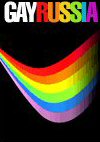
Gayrussia.ru is an LGBT rights organization based in Moscow, Russia. It has organised numerous public actions in Russia, the most famous being Moscow Pride and Slavic Pride. It also sponsored the documentary Moscow Pride '06. In November 2008, Project GayRussia.Ru extended its advocacy work into Belarus where it launched the Slavic Gay Pride movement with its local partner Gaybelarus.by.
Minsk Pride — gay pride in Minsk (Belarus). This is a festival in support of tolerance for gays, lesbians, bisexuals and transgender people in Belarus.

The Russian federal law "for the Purpose of Protecting Children from Information Advocating a Denial of Traditional Family Values", also referred to in English-language media as Russia's gay propaganda law or anti-gay law, is a bill that was unanimously approved by the State Duma on 11 June 2013, then unanimously approved by the Federation Council on 27 June 2013 and was signed into law by President Vladimir Putin on 30 June 2013.

Rainbow capitalism is the involvement of capitalism, corporatism, and consumerism in appropriating and profiting from the LGBT movement. It developed in the 20th and 21st centuries as the LGBT community became more accepted in society and developed sufficient purchasing power, known as pink money. Early rainbow capitalism was limited to gay bars and gay bathhouses, though it expanded to most industries by the early-21st century.

